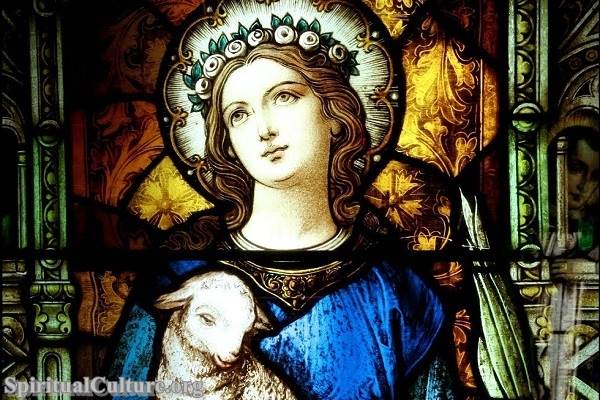For centuries, St. Anthony has been invoked by believers seeking divine assistance to recover lost items, whether they be mundane or deeply significant. But who exactly is St. Anthony, and how did he come to be associated with lost things?
In this article, Spiritual Culture delves into the life of St. Anthony, the story behind his patronage, common prayers to him, his cultural impact, and the miraculous stories that have solidified his place in the hearts of the faithful.
The Life of St. Anthony of Padua
Early Life and Background
St. Anthony of Padua was born as Fernando Martins de Bulhões on August 15, 1195, in Lisbon, Portugal, into a wealthy family of noble lineage. From an early age, Fernando demonstrated a profound interest in the teachings of the Church, coupled with an intense devotion to God. At the age of 15, he joined the Augustinian Canons, dedicating himself to a life of study and prayer. His intellectual abilities quickly became evident, and he was sent to the Abbey of Santa Cruz in Coimbra, a hub of learning in Portugal, where he spent much of his time studying theology and Latin.
Journey to the Franciscan Order
In 1220, the course of Fernando’s life changed dramatically when he encountered a group of Franciscan friars. These friars had returned from Morocco, where they had been martyred for their faith. Deeply moved by their sacrifice, Fernando decided to leave the Augustinian Canons and join the Franciscan Order. Upon taking his vows, he adopted the name Anthony, in honor of St. Anthony the Great, the father of monasticism.
Anthony initially set out for Morocco with the hope of becoming a martyr himself, but he fell gravely ill and was forced to return to Europe. Divine providence intervened when a storm redirected his ship to Sicily. There, he was eventually assigned to a small hermitage in Montepaolo, Italy, where he lived in relative obscurity until his eloquent preaching and profound knowledge were discovered. St. Anthony quickly became one of the most celebrated preachers in the Franciscan Order, renowned for his theological insights and powerful sermons that attracted large crowds.
Notable Contributions and Teachings
St. Anthony’s contributions to the Church extend beyond his association with lost things. He was an accomplished theologian and was recognized as a Doctor of the Church, a title reserved for those whose teachings have significantly influenced Christian doctrine. His sermons often focused on the importance of charity, humility, and repentance, and he was known for his ability to communicate complex theological concepts in a way that was accessible to all.
One of his most notable works, “Sermons for Sundays and Festivals,” is a collection of his homilies that continues to be studied by theologians today. In these sermons, St. Anthony emphasized the importance of living a virtuous life, grounded in faith and good works. His teachings were not only aimed at the educated clergy but also at the common people, making him a beloved figure across all social strata.
The Story Behind St. Anthony’s Patronage
The Lost Manuscript Incident
The story of how St. Anthony became the Patron Saint of Lost Things is both fascinating and miraculous. According to tradition, the incident that led to this association occurred while St. Anthony was teaching theology at a Franciscan monastery in Montpellier, France. One of the novices, who had grown disillusioned with monastic life, decided to leave the monastery. Before departing, the novice stole a valuable manuscript containing St. Anthony’s notes and teachings.
This manuscript was of great personal and professional importance to St. Anthony, as it contained years of his intellectual work. Deeply distressed by the loss, he prayed fervently to God for the manuscript’s return. Miraculously, the novice experienced a profound change of heart, repented, and returned the stolen manuscript to St. Anthony. This event marked the beginning of St. Anthony’s patronage of lost things, as his prayers were believed to have facilitated the miraculous recovery.
The Miracle of Recovery
The recovery of the manuscript was more than just a return of stolen property; it was seen as a divine intervention that highlighted St. Anthony’s holiness and deep connection with God. The event solidified his reputation as a powerful intercessor, not only for lost items but also for those who have strayed from the faith. The novice’s return and repentance underscored the transformative power of St. Anthony’s prayers, emphasizing that his intercession could lead to both spiritual and material recovery.
Repentance and Conversion of the Novice
The repentance of the novice, who not only returned the manuscript but also rejoined the monastic community, is a key aspect of the story. It exemplifies St. Anthony’s broader role as a guide for those who are spiritually lost. This incident reflects his ability to inspire conversion and repentance, further establishing him as a powerful figure in the lives of the faithful. His legacy as the Patron Saint of Lost Things thus extends beyond the recovery of physical items to the reclamation of lost souls.
Common Prayers to St. Anthony
Prayer for Lost Items
One of the most well-known prayers to St. Anthony is the “Prayer for Lost Items,” recited by millions of people who seek his help in finding missing possessions. The prayer typically goes as follows:
“St. Anthony, St. Anthony, please come around; something is lost, and it cannot be found.”This simple yet powerful invocation is often said with deep faith and trust in St. Anthony’s intercession. Many have reported finding their lost items almost immediately after praying, reinforcing their belief in St. Anthony’s miraculous assistance.
Novena to St. Anthony
Another popular devotion is the Novena to St. Anthony, a nine-day prayer that asks for his intercession in various needs, including the recovery of lost items. Each day of the novena includes specific prayers and reflections, often focused on different aspects of St. Anthony’s life and virtues. The novena is typically concluded on a Tuesday, the day of the week traditionally dedicated to St. Anthony, as it is believed to be the day when many of his miracles occurred.
Personal Testimonies of Intercession
Many people have shared personal testimonies of St. Anthony’s intercession, recounting how they found lost objects, resolved difficult situations, or experienced spiritual renewal through his prayers. These stories, passed down through generations, continue to inspire devotion to St. Anthony and reinforce his role as a powerful advocate for those in need.
The Cultural Impact of St. Anthony
Veneration Across Different Countries
St. Anthony’s veneration is a global phenomenon, transcending cultural and geographical boundaries. In Italy, Portugal, Spain, Brazil, and the Philippines, he is one of the most beloved saints. In each of these countries, unique traditions have developed around his feast day, which is celebrated on June 13th. Pilgrimages to his basilica in Padua, Italy, draw millions of visitors each year, and his image is often found in homes, churches, and businesses as a symbol of protection and guidance.
St. Anthony’s Feast Day Celebrations
St. Anthony’s feast day is celebrated with great enthusiasm and reverence in many parts of the world. In Lisbon, his birthplace, and Padua, where he died, elaborate processions, Masses, and festivals mark the occasion. In some cultures, it is customary to bless bread on his feast day, a tradition stemming from a miracle attributed to him involving the multiplication of loaves. These celebrations not only honor St. Anthony’s memory but also serve as a testament to his enduring influence.
Representation in Art and Iconography
St. Anthony is frequently depicted in religious art and iconography, often holding the Christ Child, a lily, or a book, symbolizing his purity, wisdom, and the deep relationship he had with Jesus. The image of St. Anthony holding the Christ Child comes from a vision he reportedly had, in which the infant Jesus appeared to him. This tender portrayal has become one of the most enduring symbols of St. Anthony, reflecting both his humility and his close connection to the divine.
Miraculous Stories and Anecdotes
Personal Accounts of Finding Lost Items
Over the centuries, countless stories have been told of people finding lost items through the intercession of St. Anthony. From missing keys to lost heirlooms, believers report experiencing St. Anthony’s help in moments of need. These personal accounts, often shared within families and communities, have cemented St. Anthony’s reputation as a reliable helper in times of loss.
Community Stories and Testimonials
In addition to individual stories, there are many community testimonials of St. Anthony’s miracles. In various churches and shrines dedicated to him, walls are often adorned with ex-votos—small plaques or offerings left by people in gratitude for favors received. These tokens of appreciation are a testament to the widespread belief in St. Anthony’s miraculous power and the deep trust people place in his intercession.
The Continuing Legacy of St. Anthony
St. Anthony’s legacy continues to thrive in the modern world. His patronage extends beyond just finding lost items; he is also invoked for help with infertility, financial struggles, and finding one’s way in life. The enduring devotion to St. Anthony highlights his significance in the lives of the faithful and his powerful role as a saint who understands and responds to human needs.
Conclusion: The Continuing Relevance of St. Anthony
St. Anthony in Modern Faith Practices
In today’s fast-paced world, where losing things—both material and spiritual—seems almost inevitable, the relevance of St. Anthony’s intercession remains strong. Believers continue to turn to him not just for lost items, but for guidance in navigating life’s challenges. His life and teachings offer a timeless example of faith, charity, and humility, values that are as important today as they were in his time.
Invoking St. Anthony for Other Needs
While St. Anthony is best known as the Patron Saint of Lost Things, his intercession is sought for a variety of other needs. From prayers for the sick to petitions for financial stability, St. Anthony’s role as a compassionate and understanding advocate makes him a go-to saint for many. His enduring popularity across cultures and generations speaks to the universality of his appeal and the depth of his spiritual influence.
In conclusion, St. Anthony of Padua is more than just a figure to turn to when something is lost. He represents a connection to the divine, a source of comfort in times of distress, and a model of virtuous living. His legacy as the Patron Saint of Lost Things continues to inspire faith and devotion, ensuring that his influence will be felt for generations to come.




